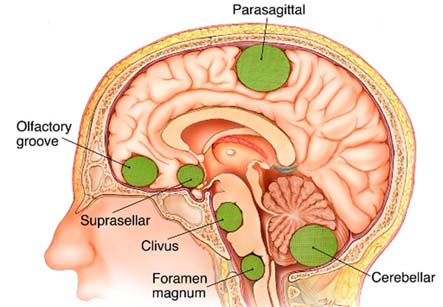Brain Surgery
Introduction
Surgery of the brain may be undertaken in various conditions. It is usually associated with fear of complications and bad prognosis. Brain surgery may be performed in cases of injury to the brain that leads to collection of blood within the skull that may press upon parts of the brain. Sometimes an aneurysm or ballooning of an artery in the brain may need treatment to prevent its accidental rupture and resultant stroke. Other reasons for surgery include brain infections, tumors, abnormal tissue deposits, epilepsy etc. Some precautions are important before brain surgery. Notable among these is stoppage of Aspirin and other blood thinners. This prevents operative bleeding risks. Smoking, alcohol and other addictions must be reported to the surgeon before the operation.
Surgical Procedure
Before the surgery the part to be operated is cleaned and shaved. The scalp is cleansed with an antiseptic lotion before the operation. The operation in most cases is performed under general anesthesia wherein the patient is rendered unconscious. The surgeon then makes an incision over the scalp. A hole is drilled into the skull. Sometimes a bone flap is lifted to expose a larger area of the brain for operation.
Iran has made significant progress in neurosurgery and The world renowned Iranian scientist in neurological surgery Professor Majid Samii has garnered the 2014 Golden Neuron Award. We have all the information you need about public and private clinics and hospitals that provide Neurosurgical surgeries in Iran, Islamic Republic Of with the best quality and lowest possible price

Recovery after brain surgery depends on the nature of the operation and the extent of surgery.
In some cases the surgeon makes a smaller hole and inserts a tube with a light and camera on the tip. This is called an endoscope. The surgery will be done with tools placed through the endoscope. MRI or CT can help guide the doctor to the proper place in the brain.
Depending on the reason for the operation the surgeon may clip an aneurysm to prevent blood flow through it. This may prevent the rupture of the aneurysm that could lead to a stroke. The surgery may also help to remove a growth or tumor in the brain, remove collected blood or infected material.
After the surgery the operative area is suctioned gently to remove the excess fluid and collected blood. A tiny tube is placed within the suture to drain off the excess fluid. The bone flap is sewn back using small metal plates, sutures, or wires. The skin is sutured and the area is bandaged.
Post Surgical Considerations
Recovery after brain surgery depends on the nature of the operation and the extent of surgery. The head end of the bed is usually kept raised to help reduce swelling of head and face. Medications are usually prescribed to alleviate pain. Hospital stay of around a week is usual. Some amount of rehabilitation or physical therapy may be needed.
Common complications include those due to anesthesia that include allergies to the anesthetic agents, problems of breathing etc. Other risks include problems with memory, speech, hearing, sight, movement, muscle weakness, balance, muscle co-ordination and other functions.
Sometimes patients may develop bleeding, stroke, coma, seizures, infections and swelling of the brain after brain surgery. These are serious complications that need immediate management.